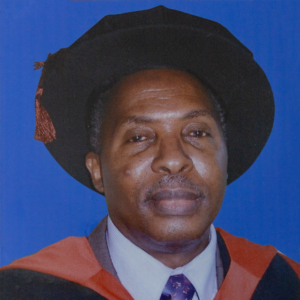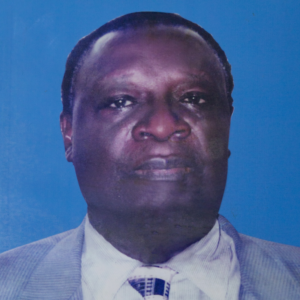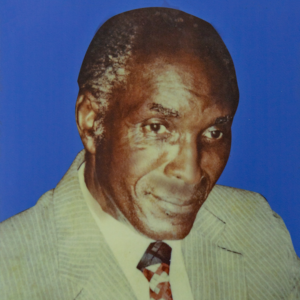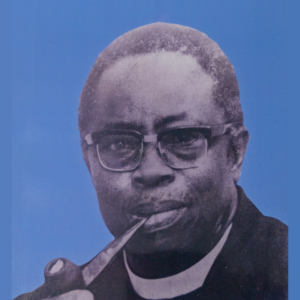Vice Chancellor & Principal

Prof. Aiah Lebbie
B.Sc. Ed(USL); M.S, PhD.(UW-Madison)
2024 – Present

Prof. Aiah Lebbie attended the Roman Catholic Primary School in Tongo Field, before completing his secondary education (Form 1 to Upper Six) at Christ the King College in Bo. He went on to obtain his Bachelor of Science degree in Education (Biological Sciences) from the University of Sierra Leone’s Njala University College in 1989. Prior to this, he spent a year working as a Research Assistant on the epidemiology of river blindness (Onchocerciasis). Between 1989 and 1992, he served as Research and Teaching Assistant in the Department of Biological Sciences at Njala University College (University of Sierra Leone). In 1992, he was offered a Fulbright Scholarship to pursue his post graduate degree from the University of Wisconsin-Madison (USA), where he obtained a Master of Science (MS) in Conservation Biology & Sustainable Development in 1995. He further pursued a PhD, which he completed in 2001 in the field of Forestry with specialization in Forest and Wildlife Ecology from the same university.
Education
Prof. Aiah Lebbie (PhD, COR), attended the Roman Catholic Primary School in Tongo Field, before completing his secondary education (Form 1 to Upper Six) at Christ the King College in Bo. He went on to obtain his Bachelor of Science degree in Education (Biological Sciences) from the University of Sierra Leone’s Njala University College in 1989. Prior to this, he spent a year working as a Research Assistant on the epidemiology of river blindness (Onchocerciasis). Between 1989 and 1992, he served as Research and Teaching Assistant in the Department of Biological Sciences at Njala University College (University of Sierra Leone). In 1992, he was offered a Fulbright Scholarship to pursue his post graduate degree from the University of Wisconsin-Madison (USA), where he obtained a Master of Science (MS) in Conservation Biology & Sustainable Development in 1995. He further pursued a PhD, which he completed in 2001 in the field of Forestry with specialization in Forest and Wildlife Ecology from the same university.
Job Experience
Upon obtaining his PhD, Prof. Aiah Lebbie returned to Sierra Leone in January of 2002 to continue his career at Njala University College. He lectured for 3 years, before departing in 2005 to pursue management career as Country Director for the Environmental Foundation for Africa in Liberia. He was responsible for the implementation of a myriad of projects, through support from UNHCR, UNDP and Stichting Vluchteling – The Dutch Refugee Agency (SV), which provided assistance to displaced persons and refugees from Cote d’Ivoire and Liberia. The activities bordered on environmental sustainability, to school rehabilitations and sustainable livelihoods options.
In 2013, Prof. Lebbie returned to Sierra Leone to assume headship of the Department of Biological Sciences at Njala University for a period of 8 years, as well as serving as acting head of the Department of Wildlife, Ecotourism and Biodiversity Conservation for 2 years. In 2019-2020, he served as Dean of the School of Environmental Sciences at Njala University. Between 2013 to present, he also served on numerous university and national committees, including Faculty Representative to the University Court; Executive Committee of Court member; member of the Committee of Deans; member of the Curriculum Review Committee; Finance and General Purposes Committee; Infrastructure Committee; University Restructuring Committee; Sierra Leone Bio-banking Governing Board, Sierra Leone Ethics and Scientific Review Board, University Statutory Budgetary Committee, Sierra Leone Urban Research Center Board, and presently as Chair of the University Scoring Committee.
Prof. Lebbie is actively involved in teaching and supervising undergraduate and graduate students, especially in areas that border on his research interests. The main thrust of his research concentrates on human interactions with natural ecosystems, and understanding the consequences on our society in the Upper Guinean Forests of Liberia and Sierra Leone. His academic research and teaching interests include: the biodiversity and cultural anthropology of sacred groves; tropical plant ecology; ethnobotany of medicinal plants; ecological surveillance and molecular diagnosis of hemorrhagic fever viruses and arboviruses in Sierra Leone; ecotourism & protected area management; environmental sustainability in conflict and post-conflict situations (displacement and refugees); and understanding the context within which health, disease, traditional knowledge and medicinal plants converge in providing wellness.
Prof. Lebbie is also the Head/Curator of the National Herbarium of Sierra Leone, and his interest in botany has led to active collaboration with the Royal Botanic Garden at Kew (UK), This collaboration resulted in several new plant discoveries. In 2014, he collected an herbarium specimen of rattan (Eresmopatha drandsfieldii) under the collection number (Lebbie, A 2590), with accompanying fruits. The fruits of this Palmae turned out to be the first known collection of this specimen to be brought to the attention of the scientific community, even though the plant had been described for over one hundred years without its flowers and fruits. In the same year, he also collected a specimen of Araceae (Lebbie, A 2601) known as Stylochaeton pilosus, which had been recorded in the early 1940s but had not been collected again for nearly 70 years, and this collection turned out to be a very rare specimen. In 2017, Prof. Lebbie collected the first known specimen of Lebbiea grandiflora (Lebbie, A 2721) in the family Podostemaceae, which was named after him as its discoverer, and the first such African genus of Podostemaceae to be described in over 30 years. This discovery was published in 2018 in the journal Plos One, and resulted in TV interviews in the UK as well as an interview on “BBC Focus on Africa” program. With funding from Defra and Kew, he is presently studying the Sierra Leone indigenous coffee known as Coffea stenophylla (Rubiaceae) under a proposed Sierra Leone Tropical Important Plant Areas (TIPAs) program in two range areas; Kasewe Forest Reserve and Kambui Hills Forest Reserve.
Following the outbreak of the Ebola virus disease in Sierra Leone, Prof. Lebbie pivoted Njala University and spearheaded a collaborative agreement with the US Centers for Disease Control and Prevention (CDC) to conduct ecological surveillance and molecular diagnosis of viral hemorrhagic fever viruses in bats and other small mammals as its Principal Investigator since 2016. This collaboration resulted in the co-discovery of the Angola type Marburg virus in the Egyptian fruit bat for the first time, and definitively established the Rousettus bat as the host for the Marburg virus. He is actively involved in building capacity in the university for surveillance of hemorrhagic fever viruses, and has a team of young and talented researchers that are active in the field and competent in molecular laboratory diagnostics. He is also collaborating with the University of Texas Medical Branch (UTMB) at Galveston (USA) for the study of mosquito-borne viruses, as well as in its D43 Training program. Three of his laboratory staff have participated in advanced training at UTMB, another two participated in training at CDC, plus two additional staff received training at the Pasteur Institute in Senegal on mosquito taxonomic and surveillance work. He has also collaborated with Milwaukee School of Engineering, and Lawrence University in Wisconsin (USA) on capacity building initiatives at Njala University.
Lebbie, A. R. and R. P. Guries. 1995. Ethnobotanical value and the conservation of sacred groves of the Kpaa Mende of Sierra Leone. Economic Botany 49(3):297-308
Lebbie, A. R. and M. S. Freudenberger. 1996. Sacred Groves in Africa: Forest Patches in Transition”. In Forest Patches in Tropical Landscapes, edited by J. Schelhas and R. Greenberg. Chapter 15, Pp.300-324. Island Press, Washington, DC.
Lebbie, A. R. and R. P. Guries. 2008. “The Role of Sacred Groves in Biodiversity
Conservation in Sierra Leone”. In African Sacred Groves: Ecological Dynamics and Social Change, edited by M. J. Sheridan and C. Nyamweru. Chapter 3. Pp. 42-61. Ohio University Press.
Cheek M, Challen G, Lebbie A, Banks H, Barberá P, Riina R. 2016. Discovering Karima
(Euphorbiaceae), a New Crotonoid Genus from West Tropical Africa Long Hidden within Croton. PLoS ONE 11(4): e0152110. doi:10.1371/journal.pone.0152110.
Lebbie, A, Kouame F and Kouassi E. 2017. Specialization in the use of ethnomedicinal
plants in Rivercess County,Liberia. Journal of Medicinal Plants Research 11(14):264-274.
Lebbie A, R. Wadsworth, J. Saidu and C. Bangura C. 2017. Predictors of Hypertension
in a Population of Undergraduate Students in Sierra Leone. International Journal of Hypertension. Article ID 8196362, 10 pages. https://doi.org/10.1155/2017/8196362.
Cheek M, and Lebbie A. 2018. Lebbiea (Podostemaceae-Podostemoideae), a new,
nearly extinct genus with foliose tepals, in Sierra Leone. PLoS ONE 13(10):e0203603. https://doi.org/10.1371/journal.pone.02013603
Ammam B.R., B.H. Bird, I.A. Bakarr, …… A. Lebbie. 2020. Isolation of Angola-like
Marburg virus from Egyptian rousette bats from West Africa. Nature Communications 11(1): 1-9.
Johnny, J., Lebbie, A., and Wadsworth, R. 2022. Ethnobotanical survey of medicinal
plants utilized by forest edge communities in southern Sierra Leone. Journal of Medicinal Plants Research 16(1):11-25.
Sesay, J. V., Lebbie, A., Wadsworth, R., Nuwamanya, E., Bado, S., and Norman, P. E.
2023. Genetic structure and diversity study of cassava (Manihot esculenta) germplasm for African Cassava Mosaic Disease and fresh root yield. Open Journal of Genetics 13(01):23-47.
Past Vice Chancellors & Principals


Professor Foday Sahr
B.Sc. Ed. B.Sc. Hon. M.B.Ch.B M.Sc., D.Sc. FWACP (Lab. Med)
2018-2023


Professor Ekundayo Jonathan David Thompson
B.A, Dip Adult Ed. (Sierra Leone); B.A Ed. M. Ed (Hall, UK); D. Ed. (South Africa)
2013-2018


Professor Jonas Redwood-Sawyer
B. Eng., M.Sc., ph.D., MIET, FSLIE
2009 – 2011 | 2011 – 2013


Professor Aiah Albert Gbakima
B.A Biology Elon College, M.S PH Public Health, Ph.D. Immunoparasitology (University of North Carolina, Chapel Hill)
2005 – 2009


Professor Aliyageen Mohamed Alghali
G.C.O.R. Ph.D
2004 – 2005


Professor Ernest Haynes Wright
B. Eng., M.Sc., ph.D., MIET, FSLIE
1998 – 2004


Professor D.E.B. Chaytor
B. Sc (Hon) (Aberdeen) ph.D (London), Hons L.L.D Aberdeen, F.R.C
1993 – 1998


Professor Kosonike Koso-Thomas
B.Sc. (St. Andrews), Ph.D (Leads), C.ENG, F.I.C.E, FRC, M.R.S.L, J.P
1984 – 1993


Prof. Arthur Thomas Porter
B.A (Dunelm,) Ph.D(Boston), J.P, M.R.S.L, Hon L.H.D (Boston), Hon L.L.D(Malta), Hon. D. LITT
1974 – 1984


Professor the Rev Canon Harry Sawyer
B.A, M.A, Ed (Dunelm), C.B.E, M.B.e, D. Litt (USL)
1970 – 1972


Dr. Sahr Thomas Matturi
B.Sc. (London & Hull) CMG
1968 – 1970 | 1972 – 1974


Professor Davidson Sylvester Hector Willoughby
B.Sc, M.D, Ph.D (Cantab); C.M (UK); G.C.O.R
1966 – 1969

